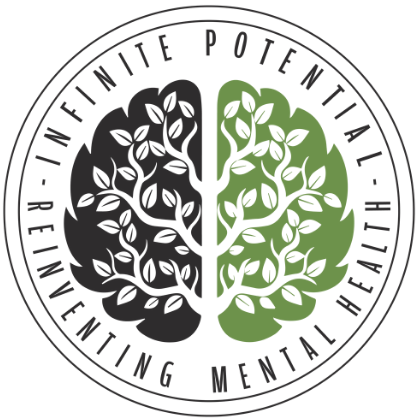Neurofeedback / Neuropathy
Neurofeedback / Neuropathy
Neurofeedback / Neuropathy
Feel Clearer, Calmer, and More in Control with Neurofeedback
At Infinite Potential we treat a wide variety of disorders in both children and adults using a multimodal treatment approach. Our primary choice of treatment is QEEG brain map based Neurofeedback, a non-invasive treatment listed by the American Academy of Pediatrics as a “Level 1, Best Support” evidence-based child and adolescent psychosocial intervention.
Our services are
based on those techniques that clinical research have demonstrated to be most effective. These services include neurofeedback and counseling. Our program is updated continually to integrate the newest strategies being developed.

Feel Clearer, Calmer, and More in Control with Neurofeedback
At Infinite Potential we treat a wide variety of disorders in both children and adults using a multimodal treatment approach. Our primary choice of treatment is QEEG brain map based Neurofeedback, a non-invasive treatment listed by the American Academy of Pediatrics as a “Level 1, Best Support” evidence-based child and adolescent psychosocial intervention.
Our services are
based on those techniques that clinical research have demonstrated to be most effective. These services include neurofeedback and counseling. Our program is updated continually to integrate the newest strategies being developed.

Feel Clearer, Calmer, and More in Control with Neurofeedback
At Infinite Potential, we treat a wide variety of disorders in both children and adults using a multimodal treatment approach. Our primary choice of treatment is QEEG brain map based Neurofeedback, a non-invasive treatment listed by the American Academy of Pediatrics as a “Level 1, Best Support” evidence-based child and adolescent psychosocial intervention.
Our services are
based on those techniques that clinical research have demonstrated to be most effective. These services include neurofeedback and counseling. Our program is updated continually to integrate the newest strategies being developed.

WHAT IS NEUROFEEDBACK?
Neurofeedback (NFB), also called neurotherapy, neurobiofeedback or EEG biofeedback (EEGBF) is a therapy technique that presents the user with real-time feedback on their brainwave activity, as measured by electrodes on the scalp, typically in the form of a video display, sound or vibration.
Years of clinical research has shown that certain aberrant electrical activity(brainwaves) in the brain correlates with health disorders such as Attention Deficit Disorder (ADD/ADHD), Anxiety, Depression, and Obsessive Compulsive Disorder (OCD).
Dysfunctional electrical activity in the brain is detected by performing an initial
QEEG Brain Map. Once the problematic brainwaves activity is normalized as determined by a normative database, the initial problems presented by the user subside.
WHAT IS NEUROFEEDBACK?
Neurofeedback (NFB), also called neurotherapy, neurobiofeedback or EEG biofeedback (EEGBF) is a therapy technique that presents the user with real-time feedback on their brainwave activity, as measured by electrodes on the scalp, typically in the form of a video display, sound or vibration. Years of clinical research has shown that certain aberrant electrical activity (brainwaves) in the brain correlates with health disorders such as Attention Deficit Disorder (ADD/ADHD), Anxiety, Depression, and Obsessive Compulsive Disorder (OCD).
Dysfunctional electrical activity in the brain is detected by performing an initial
QEEG Brain Map
. Once the problematic brainwaves activity is normalized as determined by a normative database, the initial problems presented by the user subside.
Benefits of Neurofeedback Therapy
Improved Focus & Mental Clarity
Neurofeedback can help reduce distractibility, brain fog, and mental fatigue. It's especially effective for adults and children with ADHD, helping to regulate attention and improve task completion, often with noticeable improvements after just a few sessions.
Reduced Anxiety & Emotional Reactivity
When your brain is stuck in fight-or-flight mode, it’s hard to stay calm and grounded. Neurofeedback helps your brain recognize and shift out of anxious patterns, leading to greater emotional regulation, reduced panic responses, and a steadier sense of calm—even in stressful situations.
Better Sleep & Restorative Rest
Sleep is essential for both mental and physical healing, but anxiety, racing thoughts, and irregular brain activity can make it hard to rest. Neurofeedback supports the brain in moving into a more relaxed state, helping many clients fall asleep faster, stay asleep longer, and wake up more refreshed.
Support for Mood Disorders
For those dealing with depression, mood instability, or chronic emotional exhaustion, neurofeedback can help rebalance brainwave patterns often associated with these conditions. It doesn't “fix” emotions—it teaches the brain to respond more flexibly and with greater resilience.
Increased Cognitive Performance
Students, professionals, and high-performers often use neurofeedback to sharpen memory, concentration, and information processing.
Reduced Symptoms of PTSD & Trauma
Trauma can leave the brain in a constant state of hyperarousal or shutdown. Neurofeedback helps retrain the brain away from those survival responses.
Non-Medication-Based Support
For individuals seeking alternatives to medication—or wanting to reduce reliance on it—neurofeedback offers a natural option. It’s safe for all ages and is personalized to your brain’s needs.
Lasting Change Through Neuroplasticity
The brain is capable of learning and rewiring throughout life. Neurofeedback taps into this natural adaptability (neuroplasticity), helping to create lasting improvements rather than temporary symptom relief.
What Disorders Can Neurofeedback Help With?
- Attention Deficit Disorder (ADD/ADHD)
Neurofeedback helps improve focus, reduce impulsivity, and enhance executive functioning by training the brain to regulate attention more consistently. - Anxiety Disorders
Neurofeedback supports a more relaxed, centered mental state—reducing excessive worry, panic, and restlessness. - Mood Disorders (Depression, Bipolar, etc.)
Neurofeedback can help balance brain activity associated with low mood or mood instability - Autism Spectrum Disorder (ASD)
This therapy may enhance emotional regulation, sensory processing, and focus—providing children and adults with autism greater calm and communication readiness.
- Obsessive-Compulsive Disorder (OCD)
By helping the brain release rigid, looping thought patterns, neurofeedback can reduce compulsive behaviors and anxiety-driven rituals over time. - Stroke Recovery
Neurofeedback may support neural reorganization and cognitive restoration after a stroke, assisting with motor skills, speech, and emotional balance during rehabilitation. - Post-Traumatic Stress Disorder (PTSD)
This therapy supports trauma recovery by calming hyperarousal and helping the brain re-establish a sense of safety, reducing flashbacks and emotional reactivity.

- Addictions
Neurofeedback can play a complementary role in recovery by stabilizing brain activity, improving impulse control, and reducing stress that may trigger relapse. - Obesity and Emotional Eating
It helps address patterns of emotional regulation and impulsivity that often underlie overeating, supporting more mindful habits and body awareness. - Memory Problems & Brain Fog
By improving cognitive flexibility and brainwave stability, neurofeedback may enhance memory recall, processing speed, and focus—especially in aging adults or post-injury. - Learning and Behavioral Challenges
Neurofeedback can assist with attention, emotional control, and learning readiness—making it especially helpful for children struggling in academic or behavioral settings. - Post-Concussive Syndrome
Following head trauma, neurofeedback supports cognitive and emotional recovery by helping the brain regain balance and reduce symptoms like headaches, fatigue, and irritability. - Traumatic Brain Injury (TBI)
This therapy can aid in neurorehabilitation by promoting brainwave re-regulation, improving focus, processing, and emotional stability.
Who is a Good Candidate for Neurofeedback / Neurotherapy?
Neurofeedback can be an effective tool for a wide range of patients—it’s for anyone looking to feel more balanced, focused, and in control.
Here are a few examples of who may benefit most:
Children or Adults With ADHD or Focus Issues
Helps improve attention, reduce impulsivity, and support executive functioning.
Those Seeking a Non-Medication Approach to Mental or Emotional Health
Helps improve attention, reduce impulsivity, and support executive functioning.
People Recovering From Brain Injuries, Concussions, or Trauma
Supports cognitive clarity, memory, and nervous system balance.
Individuals Struggling With Anxiety or Emotional Regulation
Promotes calmer brain activity and better stress response.
How Often Should You Do Neurofeedback?
Most clients benefit from
2 to 3 sessions per week, especially in the early stages of treatment. Consistency is key to helping your brain learn and retain new patterns.
How Long To See Results From Neurofeedback?
Some people begin noticing changes within
5 to 10 sessions, while others may take a bit longer. Lasting results typically build gradually over the course of
20 to 60 sessions, depending on your goals and needs.
Feedback Guided LearninG
Infinite Potential is committed to helping you to use your brain in healthier ways, not just mask the symptoms. Through a non-invasive quantitative EEG brain map, we can identify target areas that would benefit from training. From there, it is just learning – feedback and practice. Through weekly individualized sessions, you are guided with an instantaneous signal of changes in your brain’s electrical activity. You get a reward (auditory, visual, or both) when you meet a certain goal. No reward when you do not.
How Neurofeedback Treatment Works at Infinite Potential
At Infinite Potential, neurofeedback is a gentle, highly personalized therapy that helps your brain learn to function with more balance, clarity, and calm. We don’t just sit you in front of a screen and hope for the best—we guide you through a structured, thoughtful process built around your unique brain and goals.
Here’s what you can expect:
Initial Consultation & Intake
We begin with a one-on-one conversation to get to know you. You’ll share what’s bringing you in—whether it’s anxiety, ADHD, brain fog, or just a sense that something feels “off.” This helps us confirm whether neurofeedback is a good fit for your needs.
Brain Mapping
(qEEG Assessment)
We walk you through your brain map, explaining how different regions and brain wave patterns may be connected to the symptoms you’re experiencing—so you can better understand what’s happening and how we can help.
Your First Training Session
During your first session, you’ll sit comfortably while sensors are gently placed on your scalp. As you watch a screen or listen to music, the system provides real-time feedback to help your brain adjust its activity. The experience is usually calm and relaxing—many people find it soothing.
Note: Can You Talk During Neurofeedback?
We recommend staying still and quiet during the session so your brain can focus fully on the feedback. You're welcome to talk with your provider before or after, and if you need to speak during, we’ll guide you gently to stay on track.
Ongoing Sessions
(Typically 2–3 per Week)
Each session lasts about 30–45 minutes. Most people begin to notice changes within several weeks, though meaningful progress often builds gradually over the course of 20–40 sessions. We encourage consistency to help your brain learn and retain its new, healthier patterns.
Progress Reviews
& Adjustments
We check in regularly to monitor your progress and make adjustments if needed. Every brain responds at its own pace, so we fine-tune your plan to keep it effective and aligned with your goals.
Maintenance or Completion
When your goals are met, you may decide to wrap up treatment or shift to occasional maintenance sessions. Many clients report lasting improvements that continue to grow even after their training ends.
Cost of EEG Biofeedback Therapy at Infinite Potential
The cost of EEG biofeedback (neurofeedback) therapy at Infinite Potential is $100 per session.
The number of sessions needed varies depending on your specific treatment plan and session length.
We’ll walk you through all pricing options during your consultation and help you understand what to expect financially—no surprises, just clarity and support.
Journeys of Transformation
Support, connection, and growth—here’s how counseling made a difference.
“I have gone here for a little over a year and I have never felt more comfortable with a therapist I highly recommend them to everyone.”
- Stella
“I have known Mary professionally now for almost a year. Mary Parker is an expert in neurofeedback therapy. She is passionate about her profession and commitment to her clients and providing them with effective treatment to improve their mental health and wellbeing.”
- Charlie M.
“Mary Parker is an inspiration. She created a practice that actually gets to the root cause of mental health issues and doesn’t hand out pills. In a world of quick fixes that only mask the symptoms Infinite Potential is a unicorn of practices. Don’t overlook the magic.”
- Alena D.
Our Counselors Are Certified To Provide The Best Care

Mary Parker
LPC-S/ Director
- Certified Integrative Mental Health Provider
- Certified Neurofeedback Provider
- Functional Mental Health Practitioner
With advanced training in neurofeedback and a passion for brain-based healing, our team brings both expertise and empathy to every session. You can trust that your care is grounded in science—and delivered with heart.
Explore More Of Our Affordable Therapy Services
No matter where you are on your journey, we offer support that’s compassionate, personalized, and accessible. Discover therapy options designed to meet your needs—and your budget.
Adult
Therapy
Life can feel overwhelming at times—whether you're facing anxiety, grief, burnout, or just feeling stuck. Our counselors work one-on-one with adults to help you feel more grounded, empowered, and supported.
Child
Therapy
Children often need help making sense of big feelings and changes in their world. We offer a nurturing space where kids can explore their emotions, build resilience, and feel heard.
Couples
Therapy
Relationships can be deeply rewarding—and sometimes deeply challenging. Whether you're working through conflict, life transitions, or just want to strengthen your connection, our counselors can help you and your partner navigate it together.
Cognitive Behavioral Therapy (CBT)
CBT helps individuals identify and shift unhelpful patterns in thinking and behavior. It’s a practical, structured approach that can be especially effective for anxiety, depression, stress, and more.
Train Your Brain.
Change Your Life.
Neurotherapy is more than just brain training—it’s a safe, non-invasive way to create meaningful, lasting change from the inside out. By helping your brain regulate itself more efficiently, you open the door to better focus, calmer emotions, deeper rest, and a greater sense of wellbeing.
Curious if neurotherapy is right for you?
We’d love to learn more about your story and walk alongside you.
Reach out today and schedule a consultation—we’re here when you’re ready
fAQS ABOUT NEUROFEEDBACK
Is neurotherapy safe for children?
Yes, neurotherapy is gentle and non-invasive, making it safe for children. It’s often used to support attention, behavior regulation, and anxiety in kids as young as five.
How does neurofeedback differ from traditional talk therapy?
Neurofeedback focuses on training the brain directly through feedback, while talk therapy involves exploring thoughts and emotions. Many clients find that the two approaches complement each other well.
Can I drive or work after a neurofeedback session?
Yes, most people feel relaxed or focused afterward and can go about their day as usual. Occasionally, clients feel tired or mentally “foggy” after the first few sessions as the brain adjusts.
Is neurofeedback helpful for sleep disorders?
Yes. Neurofeedback can train the brain to shift out of overactive states, making it easier to fall asleep, stay asleep, and wake up feeling more rested.
How long does each neurofeedback session last?
Sessions typically last between 30 and 45 minutes. The process is comfortable and relaxing, often described as meditative by clients.
Can neurofeedback be used with other treatments or medications?
Yes, neurofeedback can be safely used alongside most therapies and medications. Always consult your provider, and we’ll collaborate with your care team if needed.


